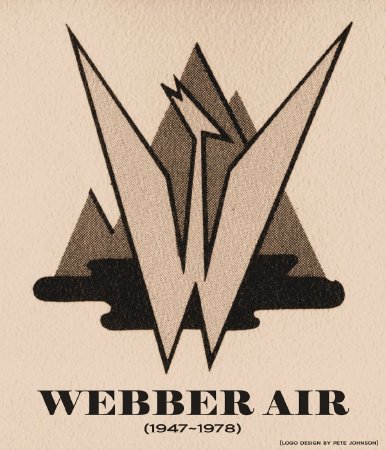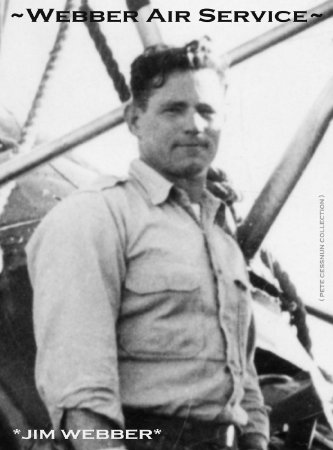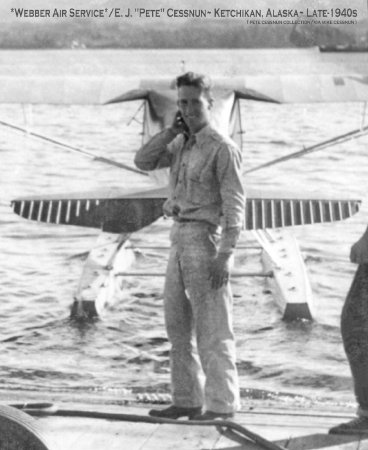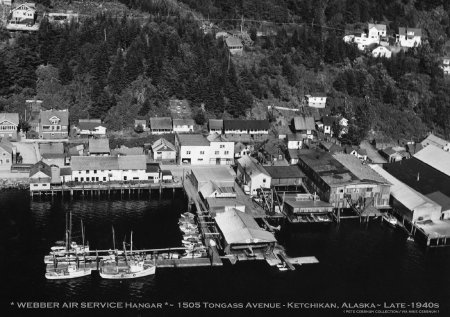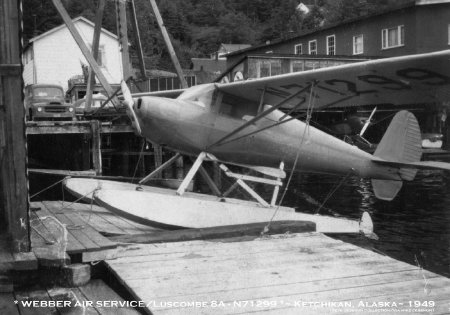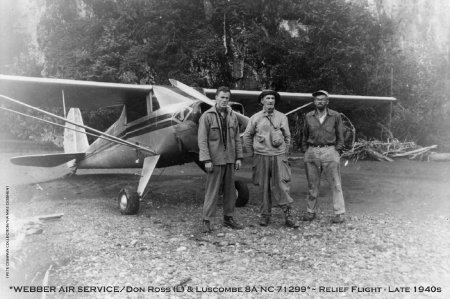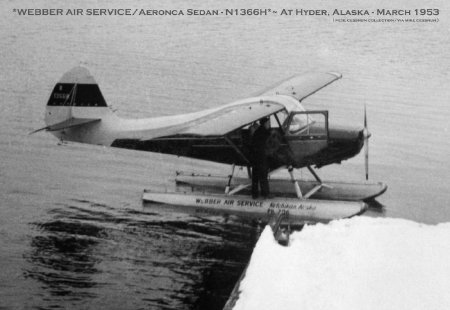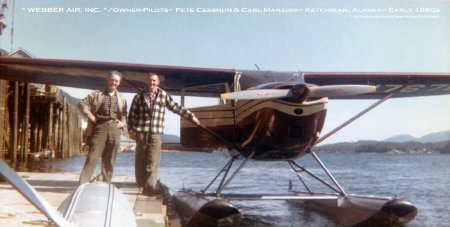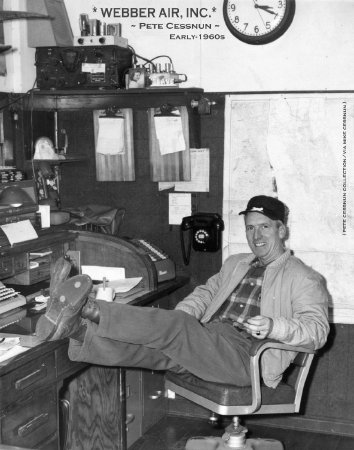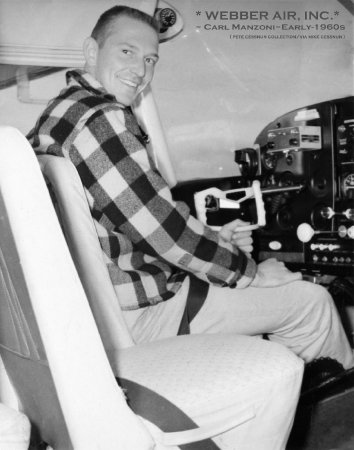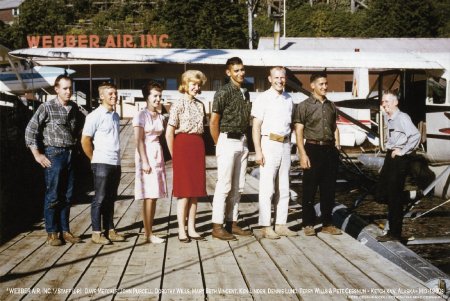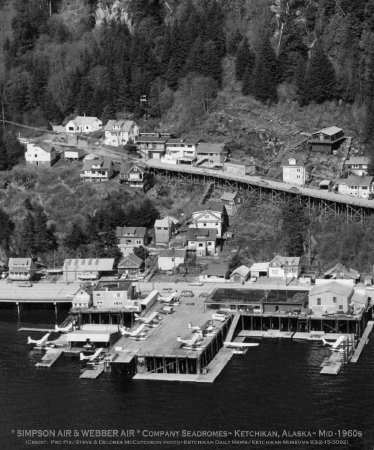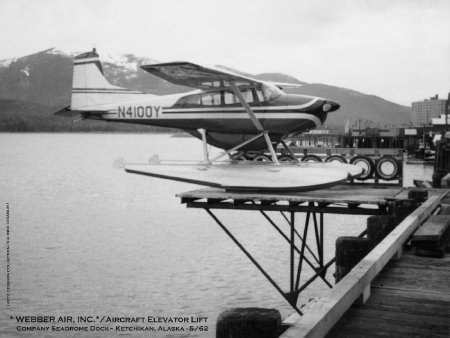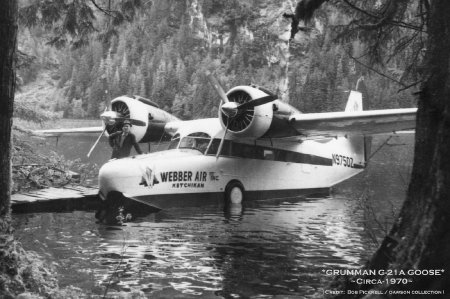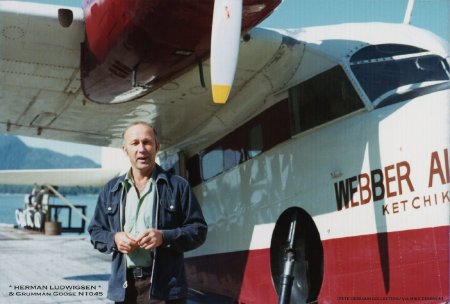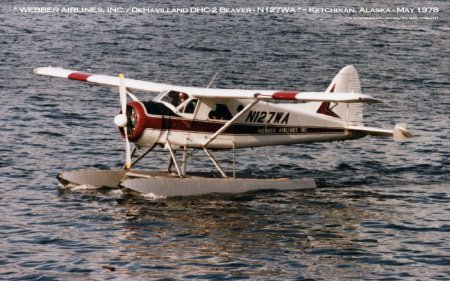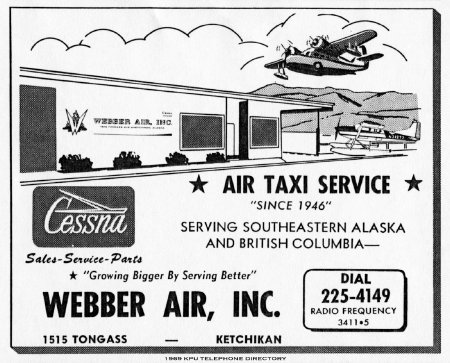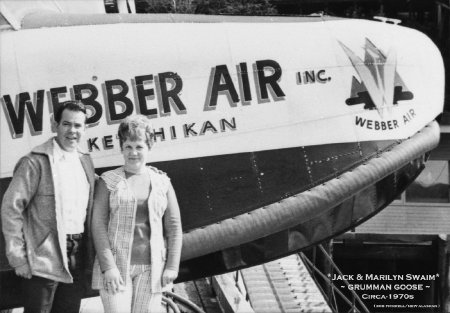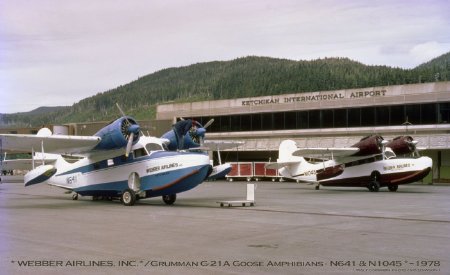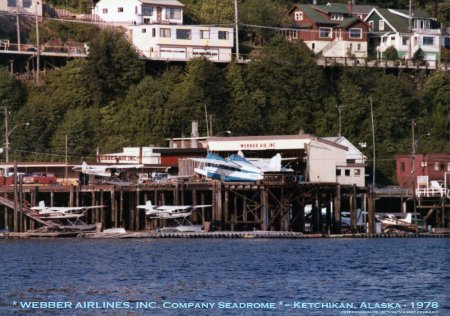Description:
Webber Air Service, 1946-1978
Webber Air Service started up in Ketchikan in 1946 by James M. Webber using a single 2-place Luscombe 8A seaplane on Edo floats (NC71101 or NC71299). Jim Webber formed a partnership that same year with Edwin J. "Pete" Cessnun. They soon welcomed Don Ross as third partner. All three were former WWII combat pilots who served overseas with the Eighth U.S. Army Air Forces in Europe. The June 1947 Ketchikan Telephone Directory lists Webber Air Service's first hangar location as being located at 1505 Tongass Avenue. Government subsidies from the G.I. Bill allowed Webber to purchase several more factory new Luscombes to establish a flight school in Ketchikan. A new 4-place Aeronca Sedan (NC1366H) was added for charter work and flightseeing excursions, which Don Ross flew up the coast from Seattle. The Aeronca proved very successful, and later a second Aeronca was acquired. In 1948, Cessnun and Ross bought out Webber's share to purchase the growing company bearing his name. Webber Air Service incorporated in 1949, and by 1954 Pete Cessnun became sole owner. Cessnun decided to convert the flight school into a full-fledged air taxi business in order to meet the increasing market demand for services. Cessnun formed a close friendship with one of the company's best pilots, Carl A. Manzoni, who eventually became a full partner in Webber Air, Inc. Carl's wife Irene helped run the office, together with Pete's wife Annie.
In 1962, the company launched major expansion construction plans to build a new larger terminal facility located on the 1515 Tongass waterfront property that was completed in July. The company ad brochure description noted: "The new Webber Air, Inc. is 'the most modern seaplane base in Alaska', offering Charter Service, Flight Instruction, Aircraft Maintenance and storage for local and transit aircraft. Webber Air is a Cessna Dealer, and operates all new modern equipment" (offering aircraft, parts, and service). The new building featured a comfortable passenger lobby and ticket counter, dispatch room, offices, and freight department. The expansive aircraft parking deck included an elevator lift to bring up the airplanes, a nose-in maintenance hangar, and fresh water spray washer to easily clean saltwater off the planes.
Five Cessna 180/185 Skywagon floatplanes comprised the heart of the fleet. One of these was Ketchikan's first Cessna 185 (N4100Y), featuring an external cargo belly pod modification. The pilot staff roster at the time was led by Pete Cessnun, Carl Manzoni, Peter Johnson, John Baker, and Don Ross as a fill in when needed. Dockhand Terry Wills was soon to get his commercial pilot license as well. Pete Johnson designed a distinctive new company logo for the aircraft and company signage, etc. Also worth mentioning is that many notable Ketchikan commercial aviators got their seaplane training as Webber Air flight school graduates, including Ellis Air captains: Hank Aegerter, Joe Diamond, Ed Zaugg, Leon Snodderly, Ray Peterson, and brothers Dick and Tom Jackson. All went to fly for Webber's major competitor located up the street. The company's future looked bright at the time, but fate struck just a few short weeks later, with the tragic August 21, 1962 Granite Basin Lake accident and loss of pilot Carl Manzoni and three passengers in the Cessna 185 (N4100Y). Despite the serious setback, Webber Air Service managed to stay in operation and continued serving the Ketchikan community at-large.
In 1967, Pete Cessnun hired local flier Herman Ludwigsen as the company's new chief pilot. Herman received his private license in 1947 while training under Jim Webber and Don Ross. After flying commercially up North for several years, he moved back to Ketchikan with his wife. Southeast Alaska's timber industry was in full swing and a Grumman G-21A Goose was added to the fleet to serve the many logging camps working the region. Ludwigsen had long wanted to fly the Grummans, and now had the chance. A Grumman Goose (N1045), fresh out of total rebuild, was bought from Lloyd Rekow at Boeing Field in Seattle and immediately put to work. A second Grumman Goose (N9750Z) was added a year later and additional Goose pilots were hired. The second Grumman Goose (N9750Z) was sold to Southeast Skyways in Juneau after two years of duty, as Webber Air Service began following Simpson Air Service's lead by introducing DeHavilland DHC-2 Beavers into the fleet. Around 1973, Pete Cessnun sold the company to pilots Jack Swaim and Max Lukin, who renamed the company Webber Airlines, Inc. The airline suffered a Beaver takeoff crash at Thorne Bay on October 17, 1974 resulting in five fatalities. More replacement aircraft were added to the fleet, and another Goose (N641) was leased from an Anchorage outfit for the 1978 season to backup Grumman Goose (N1045) again.
The humble single plane fledgling outfit evolved into Ketchikan's second largest air carrier at that point in time. Webber Air's over 30 year tenure tragically ended on August 25, 1978, following pilot/owner Jack Swaim's fatal flight accident in Goose (N1045) near Point Baker on Sumner Strait, after leaving Labouchere Bay on Prince of Wales Island carrying 11 Ketchikan bound passengers, with the loss of everyone aboard. Webber Airlines ceased operation as a corporation on July 1 1979, and merged with Paul Breed's Flair Air to become Southeast Alaska Airlines, managed by Paul and his wife Sunny Breed (with silent partners Marilyn Swaim, Pete Cessnun, and Dick Standerfer).
Aircraft:
Luscombe 8A, Aeronca 15AC Sedan, Piper J-3 Cub and Piper PA-18 Super Cub, Cessna 180/185, and DeHavilland DHC-2 Beaver and Grumman G-21A Goose.
Pilots:
Jim Webber, E. J. "Pete" Cessnun, Don Ross, Hank Aegerter, Carl Manzoni, Peter Johnson, John Baker, Terry Wills, Dennis Lund, Ken Linder, Dave Metcalf, Esko Typpi, Jerry Madsen, Herman Ludwigsen, Craig Wallitner, Dale Hahn, Allen Zink, Jack Swaim, Max Lukin, Chuck Slagle, Jim Jakubek, Randy Lanfell, Lynn Campbell, Jim Webster, Mike Cessnun, Melvin "Corkey" Swaim, Dave Ritchey, Cal Tassainer, Ernie Robb, Ed Fleek, Dan Hassell, Mark Easterly, Mike Hodge, Randy Lanfell, Jim Jakubek, Keith Stigen, Dan Sullivan, James Fulton, Lynn Joseph, and Cliff Kamm, among others.
Mechanics:
Keldon G. "Kelly" Adams, Vernon Schmutzler, Esko T. J. Typpi, Russell C. Hoglund, Foster Goodrich, and David Porter, among others.
In 1962, the company launched major expansion construction plans to build a new larger terminal facility located on the 1515 Tongass waterfront property that was completed in July. The company ad brochure description noted: "The new Webber Air, Inc. is 'the most modern seaplane base in Alaska', offering Charter Service, Flight Instruction, Aircraft Maintenance and storage for local and transit aircraft. Webber Air is a Cessna Dealer, and operates all new modern equipment" (offering aircraft, parts, and service). The new building featured a comfortable passenger lobby and ticket counter, dispatch room, offices, and freight department. The expansive aircraft parking deck included an elevator lift to bring up the airplanes, a nose-in maintenance hangar, and fresh water spray washer to easily clean saltwater off the planes.
Five Cessna 180/185 Skywagon floatplanes comprised the heart of the fleet. One of these was Ketchikan's first Cessna 185 (N4100Y), featuring an external cargo belly pod modification. The pilot staff roster at the time was led by Pete Cessnun, Carl Manzoni, Peter Johnson, John Baker, and Don Ross as a fill in when needed. Dockhand Terry Wills was soon to get his commercial pilot license as well. Pete Johnson designed a distinctive new company logo for the aircraft and company signage, etc. Also worth mentioning is that many notable Ketchikan commercial aviators got their seaplane training as Webber Air flight school graduates, including Ellis Air captains: Hank Aegerter, Joe Diamond, Ed Zaugg, Leon Snodderly, Ray Peterson, and brothers Dick and Tom Jackson. All went to fly for Webber's major competitor located up the street. The company's future looked bright at the time, but fate struck just a few short weeks later, with the tragic August 21, 1962 Granite Basin Lake accident and loss of pilot Carl Manzoni and three passengers in the Cessna 185 (N4100Y). Despite the serious setback, Webber Air Service managed to stay in operation and continued serving the Ketchikan community at-large.
In 1967, Pete Cessnun hired local flier Herman Ludwigsen as the company's new chief pilot. Herman received his private license in 1947 while training under Jim Webber and Don Ross. After flying commercially up North for several years, he moved back to Ketchikan with his wife. Southeast Alaska's timber industry was in full swing and a Grumman G-21A Goose was added to the fleet to serve the many logging camps working the region. Ludwigsen had long wanted to fly the Grummans, and now had the chance. A Grumman Goose (N1045), fresh out of total rebuild, was bought from Lloyd Rekow at Boeing Field in Seattle and immediately put to work. A second Grumman Goose (N9750Z) was added a year later and additional Goose pilots were hired. The second Grumman Goose (N9750Z) was sold to Southeast Skyways in Juneau after two years of duty, as Webber Air Service began following Simpson Air Service's lead by introducing DeHavilland DHC-2 Beavers into the fleet. Around 1973, Pete Cessnun sold the company to pilots Jack Swaim and Max Lukin, who renamed the company Webber Airlines, Inc. The airline suffered a Beaver takeoff crash at Thorne Bay on October 17, 1974 resulting in five fatalities. More replacement aircraft were added to the fleet, and another Goose (N641) was leased from an Anchorage outfit for the 1978 season to backup Grumman Goose (N1045) again.
The humble single plane fledgling outfit evolved into Ketchikan's second largest air carrier at that point in time. Webber Air's over 30 year tenure tragically ended on August 25, 1978, following pilot/owner Jack Swaim's fatal flight accident in Goose (N1045) near Point Baker on Sumner Strait, after leaving Labouchere Bay on Prince of Wales Island carrying 11 Ketchikan bound passengers, with the loss of everyone aboard. Webber Airlines ceased operation as a corporation on July 1 1979, and merged with Paul Breed's Flair Air to become Southeast Alaska Airlines, managed by Paul and his wife Sunny Breed (with silent partners Marilyn Swaim, Pete Cessnun, and Dick Standerfer).
Aircraft:
Luscombe 8A, Aeronca 15AC Sedan, Piper J-3 Cub and Piper PA-18 Super Cub, Cessna 180/185, and DeHavilland DHC-2 Beaver and Grumman G-21A Goose.
Pilots:
Jim Webber, E. J. "Pete" Cessnun, Don Ross, Hank Aegerter, Carl Manzoni, Peter Johnson, John Baker, Terry Wills, Dennis Lund, Ken Linder, Dave Metcalf, Esko Typpi, Jerry Madsen, Herman Ludwigsen, Craig Wallitner, Dale Hahn, Allen Zink, Jack Swaim, Max Lukin, Chuck Slagle, Jim Jakubek, Randy Lanfell, Lynn Campbell, Jim Webster, Mike Cessnun, Melvin "Corkey" Swaim, Dave Ritchey, Cal Tassainer, Ernie Robb, Ed Fleek, Dan Hassell, Mark Easterly, Mike Hodge, Randy Lanfell, Jim Jakubek, Keith Stigen, Dan Sullivan, James Fulton, Lynn Joseph, and Cliff Kamm, among others.
Mechanics:
Keldon G. "Kelly" Adams, Vernon Schmutzler, Esko T. J. Typpi, Russell C. Hoglund, Foster Goodrich, and David Porter, among others.
Click to Enlarge

